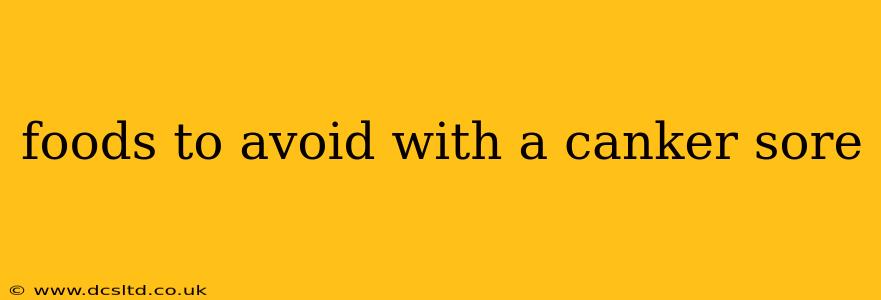Canker sores, those pesky little ulcers that pop up inside your mouth, can be incredibly painful and inconvenient. While they usually heal on their own within a week or two, certain foods can irritate them and prolong the healing process. This guide explores the foods you should avoid when battling a canker sore and offers strategies for managing your diet during this uncomfortable time.
What are Canker Sores?
Before diving into dietary restrictions, let's briefly define canker sores (also known as aphthous ulcers). These are small, shallow ulcers that develop on the soft tissues in your mouth, including the inside of your cheeks, lips, gums, and tongue. The exact cause isn't fully understood, but they're often linked to stress, minor injuries, hormonal changes, and sometimes dietary deficiencies.
Foods to Avoid with a Canker Sore: The Culprits
Certain foods can exacerbate the pain and inflammation associated with canker sores. Here's a breakdown of the main culprits:
1. Acidic Foods:
- Why they're problematic: The acidity in these foods can irritate the already sensitive tissue of a canker sore, causing a burning sensation and potentially slowing down healing.
- Examples: Citrus fruits (oranges, lemons, limes, grapefruits), tomatoes, pineapple, vinegar-based dressings, and acidic drinks like soda.
2. Spicy Foods:
- Why they're problematic: Capsaicin, the compound that makes chili peppers spicy, can further inflame the sore and cause significant discomfort.
- Examples: Chili peppers, hot sauces, curry, and other dishes with strong spices.
3. Salty Foods:
- Why they're problematic: Salt can draw out moisture from the sore, leading to increased pain and dryness. The abrasive nature of some salty snacks can also irritate the affected area.
- Examples: Potato chips, pretzels, salted nuts, and highly salted processed foods.
4. Crunchy and Hard Foods:
- Why they're problematic: These foods can physically injure the sore, causing further pain and potentially slowing down healing. The act of chewing can also be quite uncomfortable.
- Examples: Crackers, chips, hard candies, and raw vegetables like carrots or celery.
5. Certain Alcoholic Beverages:
- Why they're problematic: Alcohol can be drying and irritating to the mouth, potentially worsening the discomfort of a canker sore. Some alcoholic drinks also contain acids or sugars that further aggravate the issue.
- Examples: Wine, hard liquor, and some beers.
6. Foods Containing Gluten:
- Why they're problematic: While not definitively linked to canker sores for everyone, some individuals find that gluten-containing foods exacerbate their outbreaks. This is often linked to a potential underlying inflammatory response.
- Examples: Bread, pasta, pastries, and other foods made with wheat, barley, and rye.
What to Eat Instead: Canker Sore-Friendly Foods
While avoiding certain foods is crucial, nourishing your body with the right nutrients is equally important for faster healing. Focus on soft, bland foods that are gentle on your mouth:
- Soft fruits: Bananas, melons (avoid acidic varieties), berries (in moderation).
- Smoothies: Blend fruits, vegetables, and yogurt for a nutritious and easy-to-consume meal.
- Soups: Broths and pureed soups are excellent choices.
- Yogurt: Plain yogurt, especially Greek yogurt, is a good source of protein and probiotics.
- Oatmeal: Cooked oatmeal is soft and soothing.
- Mashed potatoes: A comforting and easily digestible option.
- Scrambled eggs: Soft and easy to chew.
How Long Do Canker Sores Last?
Most canker sores heal within 7-10 days. However, some larger or more severe sores can take longer. If your canker sore persists for longer than two weeks, or if it's unusually large or painful, consult a dentist or doctor.
Can You Prevent Canker Sores?
While not always preventable, maintaining good oral hygiene, managing stress levels, and avoiding known triggers can help reduce the frequency and severity of canker sores. A balanced diet rich in vitamins and minerals also plays a significant role in overall oral health.
This information is for general knowledge and does not constitute medical advice. Always consult with a healthcare professional for any health concerns or before making any decisions related to your health or treatment.
